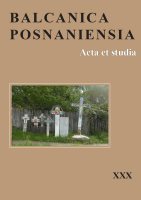THE CHOICE OF CITIZENS OR THE REGIME? LOCAL (SELF-) GOVERNMENT IN THE KINGDOM OF YUGOSLAVIA 1929–1941: A CASE STUDY OF THE SLAVONSKI BROD DISTRICT
THE CHOICE OF CITIZENS OR THE REGIME? LOCAL (SELF-) GOVERNMENT IN THE KINGDOM OF YUGOSLAVIA 1929–1941: A CASE STUDY OF THE SLAVONSKI BROD DISTRICT
Author(s): Ivan Milec, Josip JagodarSubject(s): Cultural history, Political history, Social history, Interwar Period (1920 - 1939)
Published by: Uniwersytet im. Adama Mickiewicza w Poznaniu
Keywords: Kingdom of Yugoslavia; Brod district; self-government; urban and rural municipalities; interwar period;
Summary/Abstract: During the period of the Kingdom of Yugoslavia, urban and rural municipalities were the lowest administrative units and closest to the needs of the ordinary population. The aim of this paper is to determine the level of self-government, whether the leadership of municipal administrations was an expression of the political will of the majority of the population or an instrument of the regime that ensured loyalty through various restrictions, pressures and direct nominations. This case study is spatially limited to the area of the Brod district, which was composed of one city and 18 municipalities. It is limited in period from the proclamation of the dictatorship of King Alexander in 1929 until the collapse of the Kingdom of Yugoslavia in 1941. During the 1920s, central government limited local self-government in various ways, and immediately after the proclamation of the dictatorship, it was legally abolished. However, it should be recognised that the Law on Municipalities was adopted in 1933 and the Law on City Municipalities a year later in which the regime proclaimed self-government in the municipalities, but in reality, it limited it to a great extent. The situation in cities and rural municipalities is very different. Elections for the rural municipalities were held three times (1933, 1936, 1940), while in the cities, despite announcements, these were not held until the collapse of the state. The appointment procedure adopted during the dictatorship period was retained, although the parliamentary elections of 1935 and 1938 showed that the imposed concepts did not have significant support from the electoral base.
Journal: Balcanica Posnaniensia Acta et studia
- Issue Year: 2023
- Issue No: 30
- Page Range: 187-206
- Page Count: 210
- Language: English

